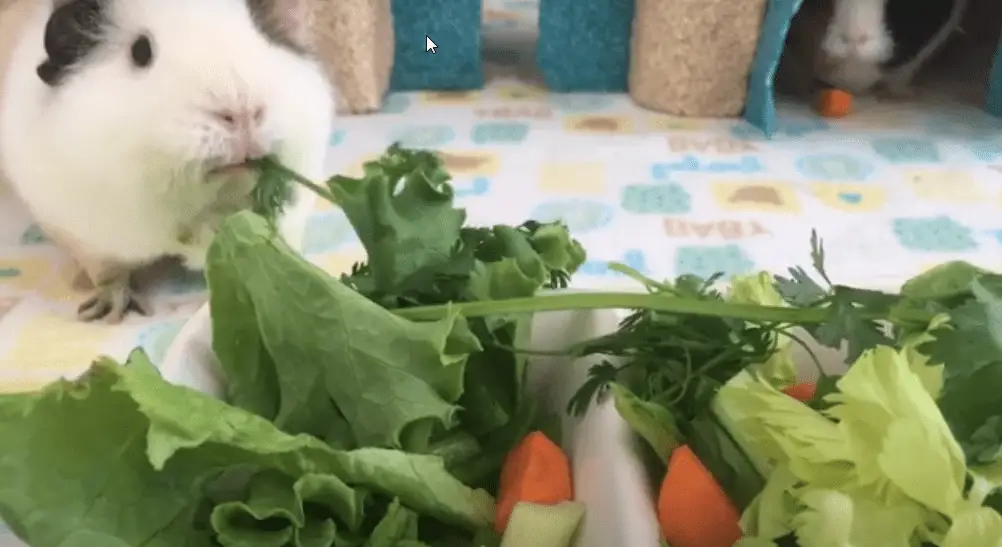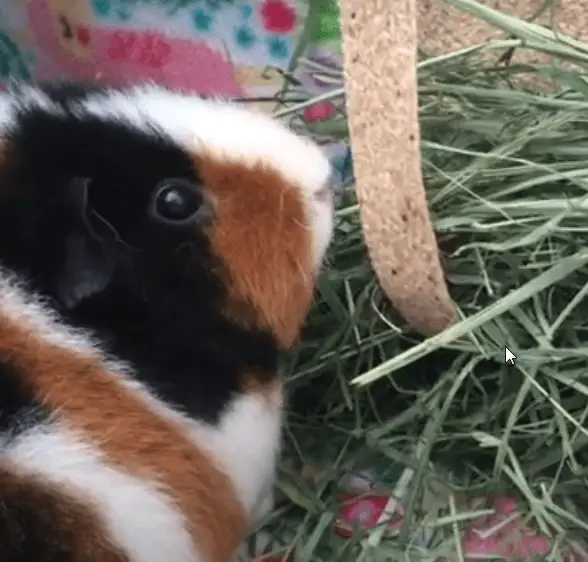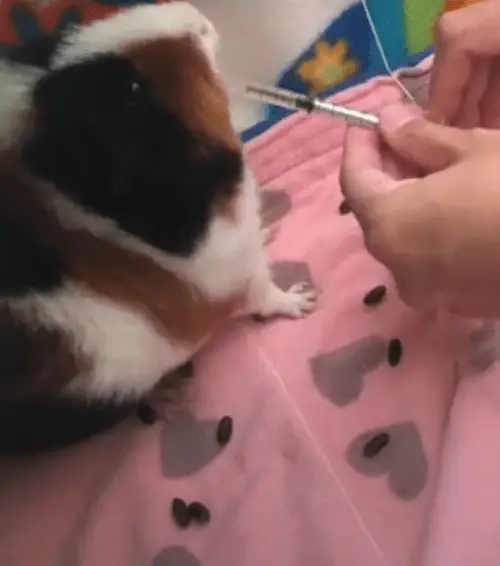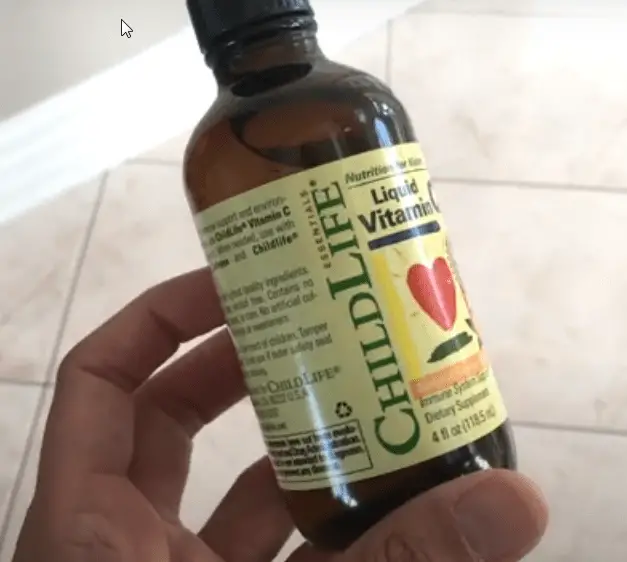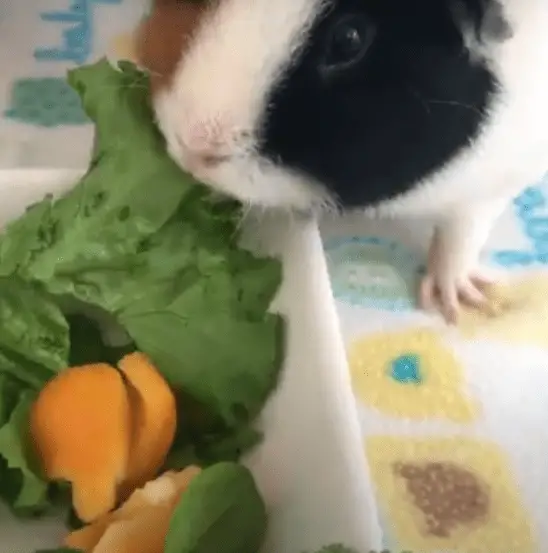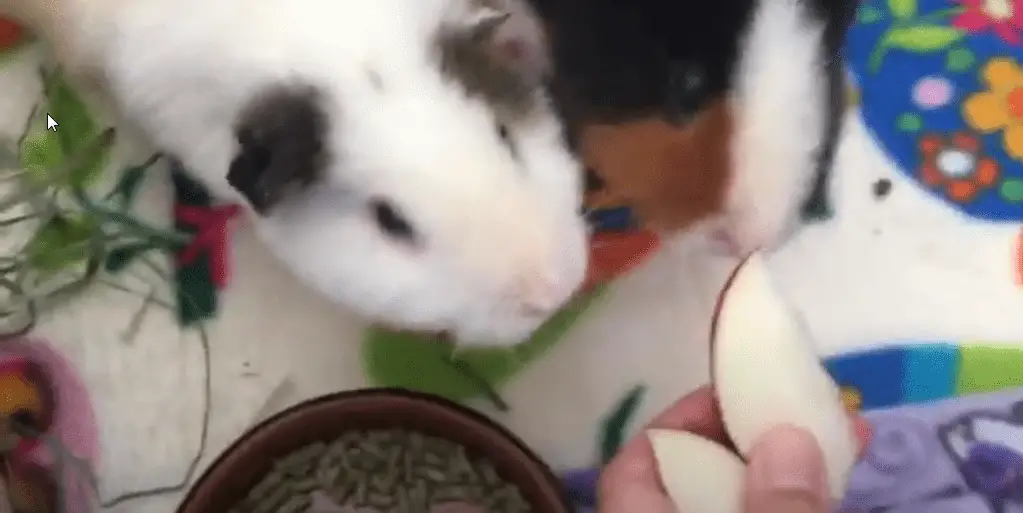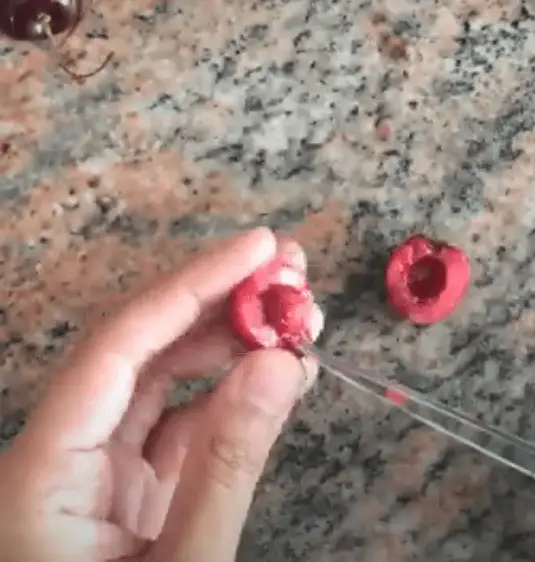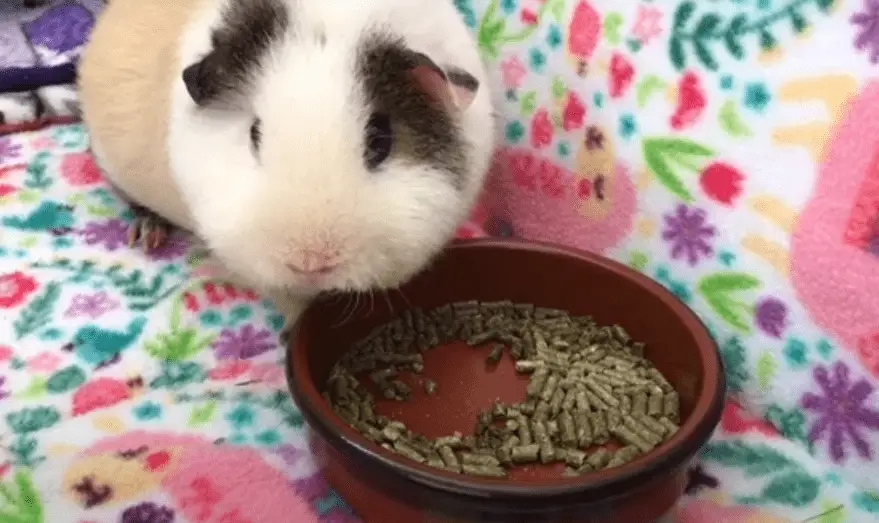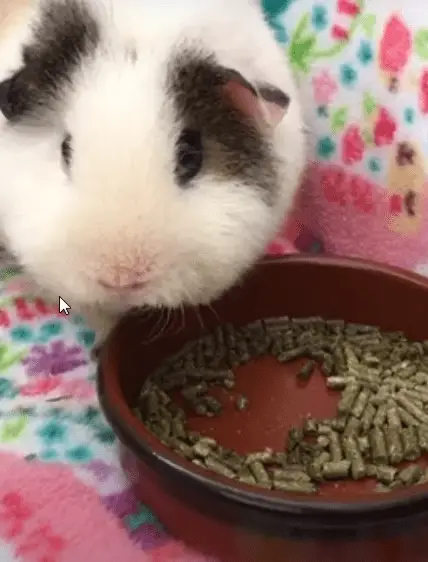What do guinea pigs eat , the Complete Guide ?
Guinea pigs are strict herbivores, feeding continuously throughout the day, and their diet regularly consists of hay (80%), Special Pellets for guinea pigs (5% to 20% if your guinea pigs don’t eat too much hay ) fruits and vegetables (15%) especially for the vitamin C ( 20 mg/kg ) that you must provide daily if they don’t have it naturally in their food to avoid that your animal has problems with the joints, teeth and can even die from it because of the deficiency in vitamin C sometimes.
I will now tell you in a little more detail what your guinea pig can and should eat and what is the best diet for him.
A Guinea Pig must have hay at will
Hay is the staple food of the guinea pig, it should make up about 80% of your guinea pig’s food and should always be available in your pet’s crate.
A good hay must smell like grass and not musty ! it must be dry, not dusty, not too much alfalfa …
Your guinea pig is going to eat a daily pile of hay that is twice its size, that’s why it needs good hay.
I wrote a whole article on the ideal hay for your guinea pig, I invite you to consult it afterwards via this link.
But to summarize, your guinea pig must have hay at will and available all the time, make sure that he also eats some of the stems of the hay and not only the leaves so that he gets all the nutrients and vitamins, that it contains and especially so that he wears out his teeth thanks to the silica contained in the stems of the hay.
I recommend Timothy hay, it is a good first cut hay, moderate protein content, rich in fiber and low in calories and fat which will facilitate the transit of your guinea pig without making him obese because he will really consume large quantities of hay and especially all the time which will occupy him and prevent him from boredom and wear his teeth.
Favour first cut hay, richer in fiber and especially the stems are bigger and they always contain their seeds, guinea pigs love them and this will avoid you to mix the seeds with the croquettes, which generally incites the guinea pig to eat the seeds and leave the croquettes, which would surely cause a food imbalance.
The hay of 2nd and 3rd cut as a treat for my guinea pig ?
You can add a little second or third cut hay, this hay is richer in proteins and fat but lower in fiber, make sure that this hay is given to your guinea pig as a treat and not as a staple food (just 10 to 20%¨du hay that you have in the guinea pig’s cage).
This hay, which contains more leaves, is also recommended for thin, old, not very hungry or recovering guinea pigs, but you will have to give fiber-rich supplements if you suspect that your guinea pig’s feces are a bit dry and if it suffers from constipation to avoid intestinal obstruction and hairball problems.
How do you recognize good hay?
A good hay for a guinea pig is often a dry hay, which has long stems and smells like plants and flowers; this hay will smell like grassland, it will be dry and green in color, it should not smell of mold or dust.
A guinea pig should have its daily dose of Vitamin C
Guinea pigs need their daily dose of vitamin C to avoid health problems, because like us, they do not synthesize it in a natural way.
To give daily vegetables and certain fruits to your guinea pig will cover a great part of its daily needs in vitamin C, I advise you for example, 25 Gr is of Pepper, Broccoli, Kiwi or orange, it is what will cover these daily needs in Vitamin C.
But if your Guinea Pig doesn’t eat or doesn’t finish its ration, you will have to give it a supplement of vitamin C directly in the mouth with a syringe, or soak a slice of broccoli with this vitamin and give it to your animal.
Avoid diluting it in water, because it deteriorates and degrades very quickly because of the light and this is why it is necessary to avoid the croquettes with vitamin C and the vitamin C in tablets, is better the liquid vitamin C , Orange Flavor (bottle childlife on amazon concentration 50 mg/ml, the one intended for the children will do the deal).
Beware of Vitamin C deficiency for your guinea pig
Vitamin C deficiency can cause severe bleeding in your guinea pig, dental problems, stunted growth and even death, especially in young specimens.
Beware of Vitamin C overdose too
Your guinea pig needs vitamin C because it is an excellent antioxidant, it will allow the absorption of iron in its intestines, it maintains the structure of the tendons and muscles of your guinea pig.
Giving more than enough vitamin C to your guinea pig will provoke kidney stones and it is very painful for your pet, it is often necessary that the animal is operated to remove these small stones,
How much vitamin C for my Guinea Pig?
You will need to weigh your animal because the daily dose of vitamin C that your guinea pig will need will depend on its weight, which is 20 mg of vitamin C per kilogram, but this dose must be tripled when it is a pregnant female or a “growing little guinea pig”.
How to give vitamin C to my guinea pig
Take the bottle of vitamin c that you have previously kept away from the light and shake it well.
Take your graduated syringe (available at pharmacists) and aspirate the number of milliliters that will contain the exact dose of vitamin C that your guinea pig will need, check beforehand the concentration of vitamin C in your vial but generally it is 0.5ml for a guinea pig that weighs one kilogram (Disclosure: it is necessary to check the concentration of vitamin C in your vial and do the calculation).
Usually you just have to put the tip of the syringe in the mouth of your guinea pig, and administer it, they love the orange taste of this liquid, if your animal refuses to swallow it, pour the contents of the syringe on a piece of its favorite vegetable or fruit (make incisions in a cucumber slice and pour the vitamin C in it).
Wash the syringe well after use and store the vial and syringe in the refrigerator and away from light.
Vegetables for my guinea pig?
Yes, the guinea pig needs a lot of fresh vegetables, and every day especially if you don’t give him his daily dose of vitamin C, but not all vegetables are good for the guinea pig and that’s what we’ll see right away.
In general, an adult guinea pig should eat 80 to 100 grams of fresh vegetables per day.
You can mix 3 to 4 different vegetables, 20 to 30 grams of each vegetable (for example, some lettuce, some red bell pepper, some cucumber slices and some coriander).
Let’s say that the quantity of vegetables necessary each day for your guinea pig is the equivalent of one cup (100 gr if you have a scale), give half in the morning and the other half in the afternoon or evening.
Divide the quantity of vegetables on two, if you have a young guinea pig in full growth, therefore just give him just 50 gr of fresh vegetables per day while tripling their dose of vitamin C (60 mg of vitamin C / day).
Here is the list of vegetables that your guinea pig can eat without any worries:
Lettuce for a guinea pig?
Yes, a guinea pig can very well eat salad (lettuce) despite popular belief, the nitrates present in almost all vegetables and especially lettuce are in fact prevented from turning into nitrites, harmful to the guinea pig by the vitamin C that you give your pet.
So give lettuce to your guinea pig but be sure that your pet has its daily dose of vitamin C, even if the lettuce is rich enough in vitamin C.
Here is a list of other vegetables that you can give your guinea pig every day:
- Romaine lettuce, curly lettuce
- White or red endive
- Coriander
- Sweet bell pepper (not hot or spicy)
- Zacchini or Courgette
Vegetables to be given with moderation to your guinea pig :
There are some vegetables that you can’t give your guinea pig every day but just twice a week for example and in small quantities and these vegetables are :
Spinach and Celery for my guinea pig ?
Especially the young shoots, you should only give some to your guinea pig once or twice a week, spinach is too rich in oxalates which could cause the appearance of kidney stones for your guinea pig, celery is too poor in Vitamin C while it contains too many oxalates, it is also to be avoided.
Parsley and kale For guinea pigs ?
Too rich in Calcium and Oxalates, to be given in moderation and to be completely prohibited for female guinea pigs who are breastfeeding because it cuts off the milk supply.
Do Ginipics eat Broccoli and cauliflower
These vegetables are to be given in moderation to your guinea pig because they cause bloating and if your guinea pig suddenly starts to fart too much in its cage, you’ll at least know what could have caused it, it’s the cruciferous vegetables.
The cucumber: is low in nutrients and calories and contains a lot of water, you can use it in slices just to support the liquid vitamin C dose.
Carrots are too rich in sugars while carrot tops are too rich in calcium, so it is to be given in moderation to your guinea pig, especially the tops (leaves).
Dandelion (stem and leaves) and Fennel: These vegetables are very rich in calcium so it is why it is necessary to give it to your guinea pig only moderately.
Tomato for a guinea pig?
You should never give the leaves and stems of tomato to the guinea pig because they are toxic, the same for potatoes, but you can give tomato to the guinea pig, I mean the fruit but in moderation because tomatoes are generally a little acidic and this often causes mouth aches to guinea pigs.
The green bean, arugula and radish leaves:
These vegetables are to be given with moderation also to the guinea pig because they contain too much calcium.
This is something important to know about calcium & guinea pigs :
The reason I am focusing on the calcium content of these feeds is because all the calcium that reaches the guinea pig’s intestines is directly absorbed in its entirety and when the guinea pig absorbs too much Calcium in its body, it will have health problems, especially kidney stones, one of the common diseases in guinea pigs.
Forbidden Vegetables for a Guinea Pig:
Here is the list of the indigestible vegetables that you must not in any case give to your guinea pig because they are toxic for him and can do him a lot of harm, even cause him death:
- Garlic
- Chives
- Rhubarb
- The lawyer
- Onions
- Leek
- The Potato ( all the plant and the bulbs )
- Hot peppers
Giving fresh fruit to guinea pigs?
Now that we have made the tour of the vegetables authorized for a guinea pig and those that are not recommended or even prohibited, we will now see the fruits that you can give to your guinea pig and in what quantities:
Fruits contain vitamins and fibers, very useful and beneficial for the guinea pig, but the problem is that fruits also contain sugar, a lot of sugar for some fruits, which will force us to sort them a little and especially make sure to give the right amount of fruit to our guinea pig to avoid digestive problems and especially diabetes, because they do not have at will in their natural environment and when the guinea pigs are in the wild, just a few berries and flowers, not really fruits and moreover when they are in cage, they do not move too much and it is thus necessary to moderate the quantity of sugar which they receive each day.
How many times to give fruits to a guinea pig ?
A guinea pig, especially if it does not often leave its cage to exercise, should only have fruits as treats and especially no more than twice a week and never for two days in a row, you must always let your guinea pig spend and burn the sugar ingested before giving him fruit again (wait at least two days and give it the third day).
What are the recommended fruits for guinea pigs?
You can give some according to the region where you live and the availability of fruits, just make sure that the fruits are well washed and peeled if you suspect that they contain pesticides.
The fruits must also be fresh and crispy and you should avoid over-ripe fruits that start to produce alcohol, they can be indigestible for your guinea pig.
The fruits that you give to the guinea pig must be fresh, well ripe and not too much but above all never give canned fruits to the guinea pigs nor fruit juice too, it’s poison that! Same for the dry fruits, dehydrated and those transformed, it is not necessary to give some to the guinea pig because they are too rich in sugars and does not contain surely vitamin C.
Here are some examples of fruits to give to your guinea pig:
Berries :
Guinea pigs love berries and this is what they generally find in their natural environment and in the wild.
The berries are very recommended for the guinea pigs, rich in vitamins C and antioxidants, they can help him to fight against the infections, in particular urinary, it is necessary to give only two or three berries at the same time because they are very rich in sugars also.
Guinea pigs love blueberries, raspberries, blackberries, elderberries and cranberries.
Stone fruits:
Peaches, nectarine, apricots and cherries are very refreshing and guinea pigs love them but be content with one small slice at a time, always wash the fruit well and especially remove the stone if not your guinea pig will risk a dental problem.
The melon for my guinea pig:
Yes, the melon with all its qualities, like watermelons are also very refreshing for the guinea pig, you can remove the seeds and the skin before giving it to your guinea pig, they do not like them and they can get stuck between their incisors and cause discomfort or even an infection.
Oranges and grapefruits:
Citrus fruits are generally acidic even if they are very rich in vitamin C, give them only twice a week and especially remove the seeds and the skin of the fruit. Never give lemon to your guinea pig, just tangerine, clementine, Thompson and Grapefruit.
The other fruits authorized for guinea pigs:
- Papaya
- The Mango
- Bananas (without the skin)
- Khaki
- The Kiwi
- The Litchi
- Pineapple (fresh and not canned)
- The Strawberries
- Apples and pears, but you need ripe fruit that is not too acidic and above all remove the seeds.
- The raisins (only one grape if they are big and two for the reasons of small size because they are very sweet)
The list of fruits you should never give to a guinea pig :
Not all fruits are good for a guinea pig and some of them are too rich either in sugars or oxalic acids and poor in vitamins especially vitamin C and are not recommended for guinea pigs, here are some of the fruits, obviously not toxic but not recommended for a ginipic:
- Plums
- The Prune
- The Dates
- Figs
Here is an example of the quantities of fruit allowed for a single guinea pig:
- One small cherry
- Only one grape (without the stone)
- Two or three blueberries
- 1 cm slice of apple, pear, peach, …
Pellets for my guinea pig :
Pellets may not appear in the list of menus to be given to your guinea pig if your animal regularly eats good hay in good quantity, its daily dose of fresh vegetables, vitamin C and fruits as treats from time to time.
But sometimes we are not sure if we really offer a well-balanced feed and good quality hay to our guinea pig and that’s where the special guinea pig pellets become a necessity .
But guinea pigs eat them and love hay, which makes the pellets just complementary and a quarter cup (a small cup) of pellets is enough for each guinea pig per day, just in case the guinea pig gets bored of eating hay and wants to change its texture.
Which Pellets are The best for my Guinea Pig ?
Choose pellets specially designed for guinea pigs, Sherwood Timothy (the most loved by guinea pigs, they really smell like the prairie) or Oxbow Essentials (second choice for me) are recommended for your small pet, these pellets are enriched with minerals and vitamins and will fill a possible deficiency in your guinea pig and ensure him a daily intake of vitamins and minerals essential to his well being.
What kind of pellets should you avoid Giving to your guinea pig ?
On the other hand, it is necessary to avoid giving pellets containing alfalfa for your guinea pig, they are too rich in calcium and it is also necessary to avoid giving him pellets intended for rabbits and other pets. Do not give pellets intended for an adult guinea pig for your young guinea pigs and vice versa, so respect the age of your animal unless your veterinarian recommends it in very particular cases.
Never mix your pellets with seeds, nuts, corn or fruits, this will encourage your guinea pig to sort only the other food and leave the pellets and not eat them which would cause deficiencies in your adorable ginipic.
Conclusion
Your guinea pig needs a good fresh water, there must be access all the time, and after that, he will also need a good feed, good Timothy hay at will in his feeder, a daily ration of fresh vegetables and without pesticides, a small cup of pellets and his dose of vitamin C, and if you want to spoil him from time to time, you can give him a piece of fruit among those I recommended but only twice a week, once every two or three days ( Hay mast be fresh and without dust cuz that’s one of the reasons that makes cavies Sneezing all the day . ( Hay mast be fresh and without dust cuz that’s one of the reasons that makes cavies Sneezing all the day ..

